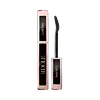What's inside
What's inside
 Key Ingredients
Key Ingredients

 Benefits
Benefits

 Concerns
Concerns

 Ingredients Side-by-side
Ingredients Side-by-side

Water
Skin ConditioningPvp
Emulsion StabilisingMica
Cosmetic ColorantOzokerite
Emulsion StabilisingStearic Acid
CleansingCetearyl Alcohol
EmollientCopernicia Cerifera Wax
Propylene Glycol
HumectantHydrogenated Vegetable Oil
EmollientNylon-6
Glyceryl Stearate
EmollientCera Alba
EmollientPEG-100 Stearate
Hydrogenated Palm Acid
Stearyl Stearate
EmollientTriethanolamine
BufferingPhenoxyethanol
PreservativeMethylparaben
PreservativePropylparaben
PreservativeTocopheryl Acetate
AntioxidantSimmondsia Chinensis Seed Oil
EmollientPisum Sativum Peptide
Skin ConditioningLeuconostoc/Radish Root Ferment Filtrate
AntimicrobialCI 77499
Cosmetic ColorantWater, Pvp, Mica, Ozokerite, Stearic Acid, Cetearyl Alcohol, Copernicia Cerifera Wax, Propylene Glycol, Hydrogenated Vegetable Oil, Nylon-6, Glyceryl Stearate, Cera Alba, PEG-100 Stearate, Hydrogenated Palm Acid, Stearyl Stearate, Triethanolamine, Phenoxyethanol, Methylparaben, Propylparaben, Tocopheryl Acetate, Simmondsia Chinensis Seed Oil, Pisum Sativum Peptide, Leuconostoc/Radish Root Ferment Filtrate, CI 77499
Water
Skin ConditioningPropylene Glycol
HumectantStyrene/Acrylates/Ammonium Methacrylate Copolymer
Polyurethane-35
Cera Alba
EmollientSynthetic Fluorphlogopite
Glyceryl Stearate
EmollientCetyl Alcohol
EmollientPEG-200 Glyceryl Stearate
Ethylenediamine/Stearyl Dimer Dilinoleate Copolymer
Skin ConditioningCopernicia Cerifera Cera
EmollientStearic Acid
CleansingPalmitic Acid
EmollientEthylene/Va Copolymer
Emulsion StabilisingAlcohol Denat.
AntimicrobialCamellia Sinensis Leaf Extract
AntimicrobialParaffin
PerfumingGlycerin
HumectantSodium Laureth Sulfate
CleansingMyristic Acid
CleansingAminomethyl Propanediol
BufferingDisodium EDTA
Hydroxyethylcellulose
Emulsion StabilisingCaprylic/Capric Triglyceride
MaskingCaprylyl Glycol
EmollientTetrasodium EDTA
Xanthan Gum
EmulsifyingButylene Glycol
HumectantPentaerythrityl Tetra-Di-T-Butyl Hydroxyhydrocinnamate
AntioxidantPotassium Sorbate
PreservativePhenoxyethanol
PreservativeCI 77499
Cosmetic ColorantWater, Propylene Glycol, Styrene/Acrylates/Ammonium Methacrylate Copolymer, Polyurethane-35, Cera Alba, Synthetic Fluorphlogopite, Glyceryl Stearate, Cetyl Alcohol, PEG-200 Glyceryl Stearate, Ethylenediamine/Stearyl Dimer Dilinoleate Copolymer, Copernicia Cerifera Cera, Stearic Acid, Palmitic Acid, Ethylene/Va Copolymer, Alcohol Denat., Camellia Sinensis Leaf Extract, Paraffin, Glycerin, Sodium Laureth Sulfate, Myristic Acid, Aminomethyl Propanediol, Disodium EDTA, Hydroxyethylcellulose, Caprylic/Capric Triglyceride, Caprylyl Glycol, Tetrasodium EDTA, Xanthan Gum, Butylene Glycol, Pentaerythrityl Tetra-Di-T-Butyl Hydroxyhydrocinnamate, Potassium Sorbate, Phenoxyethanol, CI 77499
 Reviews
Reviews

Ingredients Explained
These ingredients are found in both products.
Ingredients higher up in an ingredient list are typically present in a larger amount.
Cera alba is beeswax, or the wax used by bees to make honeycombs. It is a texture-enhancer and emollient. A study from 2003 found beeswax to be a stronger emollient than ingredients such as petroleum jelly.
As an emollient, beeswax helps hydrate the skin by creating a barrier on top. This barrier traps moisture in.
Emulsifiers help prevent ingredients from separating. This helps create consistent texture.
The structure of beeswax is mainly long-chain alcohols and the esters of fatty acids.
There are three types of beeswax: yellow, white, and absolute. Yellow is pure beeswax taken from the honeycomb. White beeswax is created by filtering or bleaching yellow beeswax. Absolute beeswax is created by treating beeswax with alcohol. Beeswax used in cosmetics are purified.
Beeswax has been used throughout history and even in prehistoric times. Some common uses for beeswax still used today are making candles, as a waterproofing agent, and polish for leather.
Learn more about Cera AlbaCi 77499 is also hydrated iron III oxide. It is created from mixing red and black iron oxides. This helps give shades of darkness to a product.
Iron III oxides are classified as inorganic chemicals for coloring.
Glyceryl Stearate is a mix of glycerin and stearic acid.
It is used to stabilize the mixing of water and oil ingredients. By preventing these ingredients from separating, it can help elongate shelf life. It can also help thicken the product's texture.
As an emollient, it helps soften skin and supports barrier-replenishing ingredients.
In cosmetics, Glyceryl Stearate is often made from vegetable oils or synthetically produced.
This ingredient may not be fungal-acne safe
Fun fact: The human body also creates Glyceryl Stearate naturally.
Learn more about Glyceryl StearatePhenoxyethanol is a preservative that has germicide, antimicrobial, and aromatic properties. Studies show that phenoxyethanol can prevent microbial growth. By itself, it has a scent that is similar to that of a rose.
It's often used in formulations along with Caprylyl Glycol to preserve the shelf life of products.
Propylene Glycol is an odorless, colorless liquid. As a humectant, it helps skin retain moisture. It also aids in delivering active ingredients.
Another role of this ingredient is preventing a product from melting or freezing. Propylene glycol also adds antimicrobrial properties to a product, elongating product lifespan.
This ingredient is considered an organic alcohol and commonly added into both cosmetics and foods.
Those with sensitive skin or conditions may develop a rash when using this ingredient.
Learn more about Propylene GlycolStearic Acid is a fatty acid. It is an emollient, emulsifier, and texture enhancer.
As an emollient, stearic acid helps soften skin. It aids the skin's protective barrier by preventing water loss. It also provides a gentle cleansing effect without stripping away natural oils.
Stearic acid may also be used to enhance the texture of products. It can add volume and stabilize ingredients such as water and oil. This can help water and oil ingredients from separating.
Sources of stearic acid include animal or vegetable fats/oils such as coconut or shea. It can be naturally found in butter, cocoa butter, shea butter, vegetable fats, and animal tallow.
This ingredient may not be Malassezia folliculitis, or fungal-acne safe.
Learn more about Stearic AcidWater. It's the most common cosmetic ingredient of all. You'll usually see it at the top of ingredient lists, meaning that it makes up the largest part of the product.
So why is it so popular? Water most often acts as a solvent - this means that it helps dissolve other ingredients into the formulation.
You'll also recognize water as that liquid we all need to stay alive. If you see this, drink a glass of water. Stay hydrated!
Learn more about Water